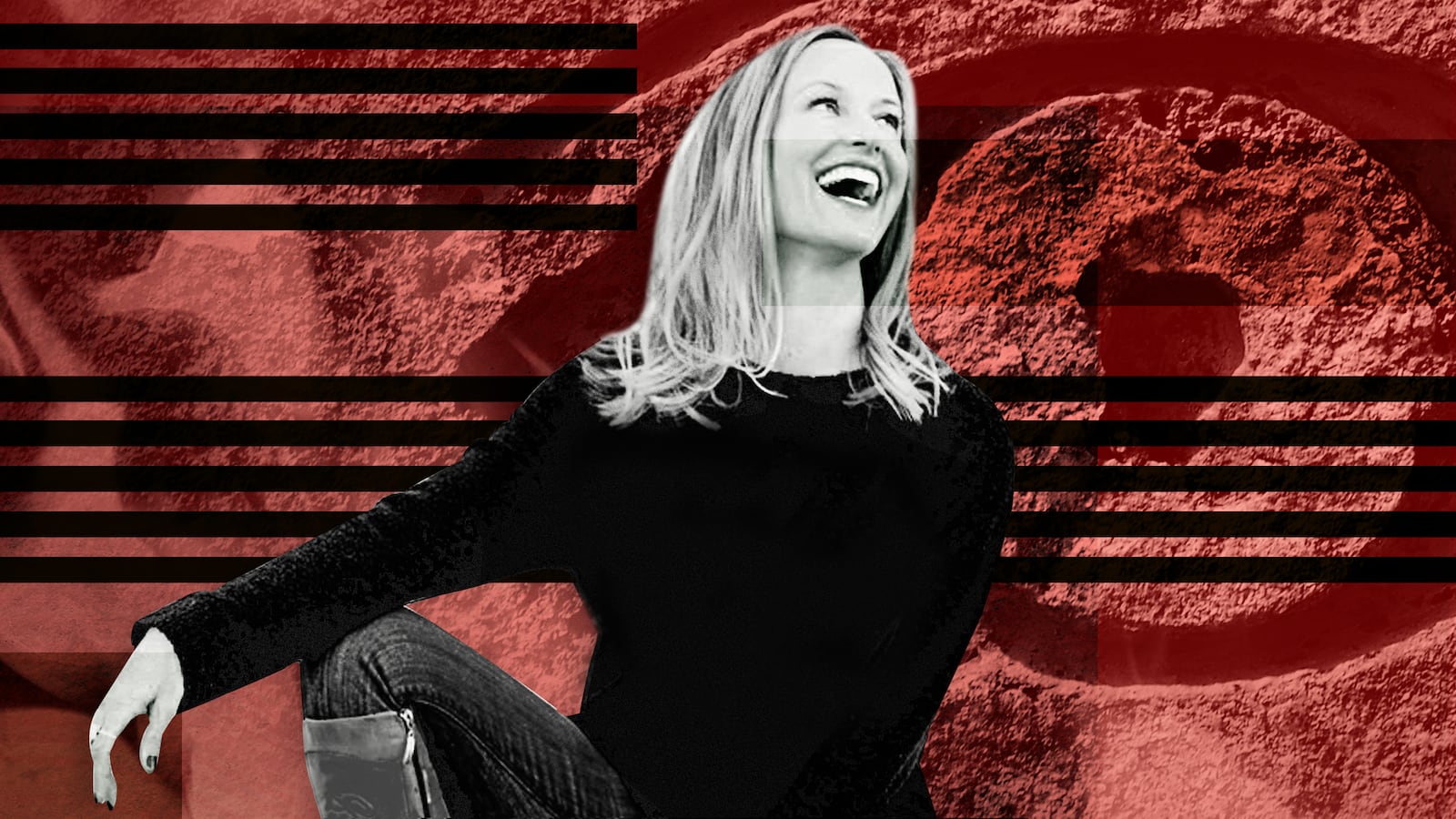Renee Linnell dislikes being labeled a “cult survivor.”
In fact, she’d prefer to gloss over that aspect of her identity entirely, and instead be recognized for her work as an inspirational speaker and author. Linnell also has an MBA from New York University’s Stern School of Business—no small feat for a former tango dancer and surfer who spent much of her adult life under the control of a shady group that billed itself as the University of Mysticism.
In a conversation with The Daily Beast, Linnell elaborated on her time spent in the cult, now the subject of her recent memoir The Burn Zone, which was released earlier this year. “I don’t love being labeled ‘cult survivor,’” she says when asked about her book tour, adding, “I got home and I went, “OK, I don’t need to be ‘cult survivor’ anymore. I’m just Renee with a really interesting story.”
Linnell’s story is, indeed, interesting. Born into a well-off family, she spent most of her childhood on a boat in the Bahamas or in Florida, nurturing a love of the outdoors, and especially the ocean, that would follow her well into adulthood. Chafing at her conservative, alcoholic mother’s strict rules, Linnell hitchhiked through Costa Rica as a teenager, and continued to travel as soon as she was done with college.
From there, Linnell’s life reads like something out of an adventure film. She honed her surf skills on the beaches of Hawaii. She took a job as a swimsuit model that eventually led her all over the world. A prolific dancer, Linnell developed a passion for the tango, and spent months of her life training with dancers in Buenos Aires. But, as Linnell explained during our conversation, a fabulous lifestyle wasn’t all it was cracked up to be—there was still, she said, something missing. “I had lived this life—my life—for 33 years, which was this dream life,” she explains, “but I was so sad and empty inside.”
This emptiness led to something akin to existential ennui—what Linnell termed “soul sickness” in her memoir. It also set the stage for her indoctrination into a group that would eventually swindle Linnell out of hundreds of thousands of dollars, and cause her to frequently question her grip on reality, over the course of five traumatic years.
Linnell was first introduced to the University of Mysticism (which billed itself as “more difficult, more intense, and more outrageous” than other spiritual practices) after she attended a meditation class in California with a friend. Spying a flier for the group on the wall, she decided to attend a session—and had no idea how drastically her life would change thereafter.
In The Burn Zone, Linnell explains how she was struck by the group’s doctrine, which encouraged a dedication to one’s career and personal wealth over the more stereotypical, patchouli-scented mysticism of other practices. And then there was her complicated upbringing, and desire for something more. After attending a University of Mysticism session led by a woman referred to as “Lakshmi” in the memoir, Linnell was hooked. “I wanted to be like her,” she writes. “Everything about her was so polished.”
Not only that, but Linnell, who was raised Catholic but turned off by the strict dogma of the religion, was drawn to Lakshmi’s interpretation of spirituality, too. “I found myself intuitively understanding God was the intense love and light and peace I experienced in Laskhmi’s presence,” Linnell writes. “I loved her irreverence. And I loved that she talked about making money and having a great job and sharpening your mind as a way to walk a spiritual path… I just had to figure out how to become her student.”
Becoming Lakshmi’s student wasn’t exactly easy. She had to attend numerous meditation sessions before she could even apply to “study” under Lakshmi in the University of Mysticism. Eventually, Linnell was accepted, and began consuming the books and films Lakshmi recommended to her students in their course of study. “Rather than call our program ‘University of Mysticism,’ as she had on the posters and flyers, she called it CDT, standing for ‘Career Development Training,’” Linnell explains in her memoir.
For their first session with Lakshmi, Linnell and her fellow students had to follow a strict protocol. “We were told to dress business casual and to bring a tuition of $150 in crisp, brand-new bills,” Linnell writes, adding, “It was an expression of proper etiquette, [Lakshmi] told us, to pay for spiritual teaching with brand-new bills which, we were told, were energetically cleaner… than bills that had been touched by countless other people.”

Linnell quickly rose through the ranks of the University of Mysticism, attracting the attention of Lakshmi and her “consort,” a man Linnell refers to as “Vishnu”—all while becoming increasingly isolated from her friends, family, and former way of life. Encouraged by Lakshmi, Linnell abandoned her promising dancing career to become a computer programmer, a career Lakshmi approved of due to the high pay. Soon after, Linnell and some fellow students signed up for a “power trip” to Egypt, led by Lakshmi, Vishnu, and more senior students. The cost? $15,000. “I was stunned, and my stomach sank,” Linnell writes of her reaction when she heard about the price tag. “They are using us, I thought.” According to Linnell, $5,000 was for the travel costs alone, with the remaining $10,000 acting as an “empowerment fee,” which “went directly into Lakshmi’s bank account.”
But Linnell, determined to reach Enlightenment somehow, paid the fee, and became even further cut off from life beyond the University of Mysticism. On the eve of the group’s trip to Egypt, leaders cautioned them to reveal nothing to friends and family, and to stop using social media, sharing personal information with friends, and spending time with people outside of the group. And so, Linnell explains, they did: “We got P.O. boxes, we listed our phone numbers as private, we stopped inviting people to our homes, we disappeared from the internet, and we hid from cameras. We didn’t even tell people we were going to Egypt… we lied to our friends and families. We danced around direct questions about our lives.”
The basis of the University of Mysticism’s dogma was energy. Crisp bills, expensive clothing, fancy cars, and luxury hotels were all energetically “clean,” whereas a humbler lifestyle was energetically “dirty.” Group members were encouraged to keep to themselves, lest they become energetically contaminated by nonmembers. And “occult forces” were nearly always at play—and nearly always to blame when one of the group leaders slipped up, or had a flash of petty anger.
Singled out by group leaders due to her immense “power” (read: ability to pay the group’s increasingly exorbitant fees in full), Linnell soon became in charge of Lakshmi’s activities and accommodations. “There was no pay, of course (it was selfless service to the guru), but I didn’t care,” Linnell writes of her new tasks. As the months went by, Linnell writes that she “felt as if I had a purpose. For the first time in a very long time, I was truly happy.”
Linnell’s happiness would be short-lived, as Lakshmi, increasingly jealous of the attention Vishnu paid Linnell, began ordering her around, accusing her of using her sexuality to attract Vishnu, and even turning the other women in the group against Linnell, calling her a “witch” who was poisoning their minds. Vishnu, for his part, relentlessly pursued Linnell until she yielded; their relationship was toxic, characterized by gaslighting and emotional abuse from Vishnu’s end. At the height of the abuse, Linnell was essentially working as a live-in maid for Lakshmi and Vishnu, trying to fend off their vitriolic psychological abuse.
It half-worked. Determined to get rid of Linnell, Lakshmi sent her to the East Coast to pursue an MBA. The only way Linnell could rejoin the group, Lakshmi explained, was by founding a company that made $10 million in profits after taxes. Linnell did receive her MBA from NYU, becoming embroiled with an equally abusive romantic and business partner along the way. But after her suit against her former partner turned nasty, Linnell fled to Colorado; she’d been effectively cut off from the group soon after she moved to New York
Reflecting in the mountains, nearly five years after Linnell first attended Lakshmi’s meditation session in California, the truth hit her: she’d spent the last several years of her life in a cult.
“There were flashes all along, [during] those years in the group, where I did have clarity, and I did see that this really isn’t right, and these teachers aren’t good,” Linnell tells The Daily Beast. “They get you to not trust your own intuition… So yes, there were signs all along the way. And then my self-doubt, [coupled] with all of their teachings on the occult and our ego, talked me out of paying attention.”
According to Linnell, “it was kind of the perfect storm of events” that led her to join the group and remain a loyal member, even after the psychological and emotional abuse began. “I did have a deep self-doubt... which comes from being a child of an alcoholic,” she explains to me. “And I was taught that love pattern—that my mother loved me, and then hated me, and loved me, and then hated me. And so… I think that sets people up to then, in relationships that are good, and then bad, and then good, and then bad, to keep thinking, ‘Well if only I tried a little bit harder this [relationship] would work.’ So I had that [mentality] going on—‘if only I tried a little bit harder.’”
Ultimately, she was glad to have endured the experience: “I wouldn’t undo any of it,” she says. She even confesses that she’s completely forgiven Lakshmi and Vishnu for the torture they inflicted on her. “I really do mean it when I say, as awful as they were, I’ve completely forgiven them,” Linnell tells The Daily Beast. “I’m able to now, on the other side, see the beauty in the damage.”








